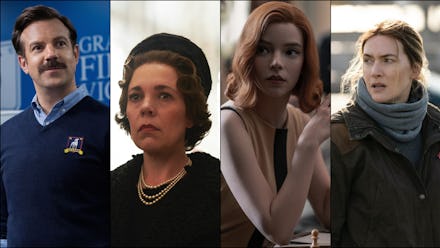According to the Emmys, only four shows mattered last year

Even with the coronavirus pandemic, which halted production on most shows, nearly 500 scripted television series premiered in 2020. But you wouldn't know that based on the select few programs feted by the 2021 Emmy Awards. The Crown won seven trophies, more than any other show, and straight-up swept the drama acting categories. Ted Lasso was the favorite comedy series of the night, dominating those acting awards as well. (The exception being Jean Smart, who took home Best Actress in a Comedy for Hacks.) On the limited series side of things, The Queen's Gambit was the big winner for excellence behind the camera, whereas Emmy voters chose three cast members from Mare of Easttown for acting nods.
All of these shows are very good, but so many other excellent television experiences dropped between June 2020 and May 2021 that were barely even considered. Where was the profoundly strange How To With John Wilson? Or the scintillating strip club drama P-Valley? Apparently none of the Emmy voters bothered watching Veneno and it appears they forgot about Luca Guadagnino's gorgeous, affecting We Are Who We Are. Some really great series — like The Flight Attendant, Lovecraft Country, Pen15, The Underground Railroad and I May Destroy You — earned nominations, but when it came to doling out the actual awards on Sunday night, the Emmys mostly stuck with a handful of (far whiter) favorites.
Despite a record number of non-white creatives being nominated in the acting and reality hosting categories, none of the performance awards went to an actor of color. There were plenty favored contenders, like Billy Porter and Mj Rodriguez for Pose and the late Michael K. Williams for Lovecraft Country. Even though they were up against four different actors from Ted Lasso, Kenan Thompson and Bowen Yang each had a solid shot at a supporting award for Saturday Night Live. They all came away empty handed. It was two hours into the telecast before a person of color was recognized: RuPaul Charles and the team behind RuPaul’s Drag Race, who won Outstanding Competition Program for the fourth consecutive year. (RuPaul now holds the record for most Emmy wins by a person of color.)
One bright spot was Michaela Coel's win for writing I May Destroy You. Unlike the director of The Queen's Gambit, who delivered a tiresome two-page diatribe, she gave a concise and inspiring acceptance speech. "In a world that entices us to browse the lives of others to help us better determine how we feel about ourselves, and to, in turn, feel the need to be constantly visible — for visibility, these days, seems to somehow equate to success — do not be afraid to disappear. From it, from us, for a while. And see what comes to you in the silence," she advised creatives. Coel is the first Black woman to win the limited series writing category. It was a moment of well-deserved recognition for a profoundly affecting show that was egregiously snubbed by the Golden Globes.
The looming and hard-to-answer question is why are the Emmys like this? With nearly 20,000 voting members, you'd think the field of nominees and winners would be more varied. There's no way that many film and TV professionals agreed a handful of shows deserved to be celebrated while hundreds more were ignored. Perhaps the lobbying power of Netflix has something to do with it, or the fact that some categories were flooded with nominees from entertainment that isn't really television, like the taped performance of Hamilton on Disney+. It's really tiresome that awards shows pull this crap time and time again.
On the other hand, even before Covid made them more insufferable, awards shows have been dying a slow death. Nobody tunes in to telecasts anymore, when you can catch the highlights on social media. It seems unlikely that people still lean on awards to tell them what to watch either. If you were going to watch The Queen's Gambit, The Crown or Mare of Easttown, odds are you did so when everyone else was binging them too. It'd be one thing if the Emmys highlighted under-appreciated TV, celebrating examples of serial storytelling that break boundaries and challenge the medium. But by sticking with safe people-pleasers, awards shows are cementing their irrelevance.